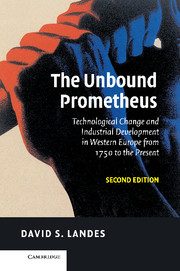 The Unbound Prometheus
The Unbound Prometheus 6 - The interwar years
Published online by Cambridge University Press: 05 June 2014
Summary
THE ECONOMIC CONSEQUENCES OF THE PHONEY PEACE
It is not easy to write the economic history of the twentieth century. For one thing, it is too close to us; for another, it is messy by comparison with the halcyon nineteenth. For a hundred years Europe had not known a major war, and her economies had been free to develop with little distraction from political and military quarters. To be sure, all of them in some degree had started with the handicap of a pre-industxial social and legal structure, some of it not only not favourable to capitalism but developed in antagonism to it. But the history of economic policy in the nineteenth century is largely one of liberation from this legacy, and to the degree that this liberation was effective and the natural and human resources for growth were available, the economies of Europe transformed themselves and waxed mighty. The story of each, mutatis mutandis, fits closely to a kind of ideal model of modernization; the leitmotif is the process of industrial revolution.
The twentieth century by contrast is a confusion of emergencies, disasters, improvisations, and artificial expedients. One passes in a few weeks of 1914 from a quiet stream, as it were, to white water.
Yet economic history, more even than other branches of history, abhors chronological boundaries.
- Type
- Chapter
- Information
- The Unbound PrometheusTechnological Change and Industrial Development in Western Europe from 1750 to the Present, pp. 359 - 485Publisher: Cambridge University PressPrint publication year: 2003
